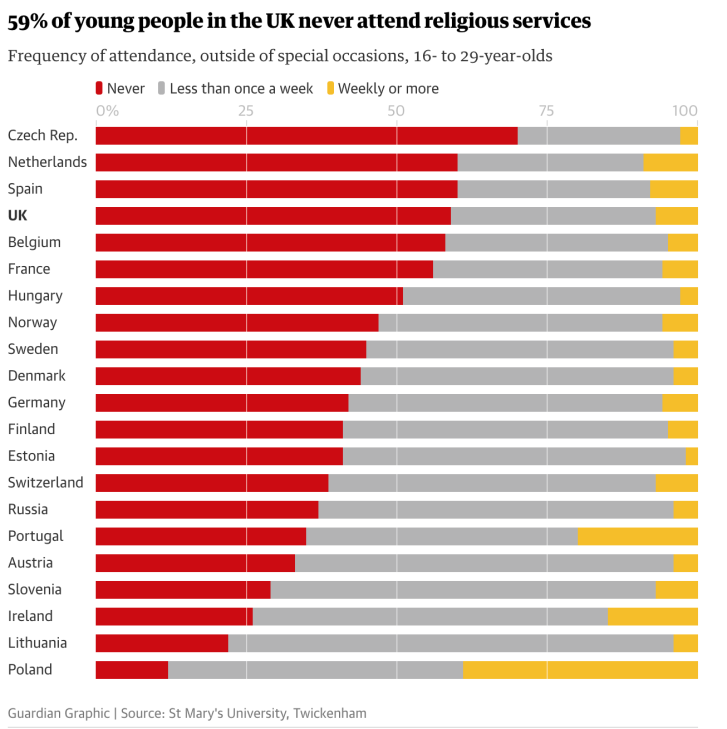
These are the five key findings from a report, 'Europe's Young Adults and Religion', by Professor Stephen Bullivant, a professor of theology and the sociology of religion at St Mary's University in London. I had never heard of this university but it is a Catholic college which was recently made a university (“When everyone is somebody, then no one's anybody”) and is housed in Horace Walpole's Strawberry Hill, a house I'd love to visit.
1. The proportion of young adults (16-29) with no religious affiliation (‘nones’) is as high as 91% in the Czech Republic, 80% in Estonia, and 75% in Sweden.
These compare to only 1% in Israel, 17% in Poland, and 25% in Lithuania. In the UK and France, the proportions are 70% and 64% respectively. [Fig. 1.1]
2. 70% of Czech young adults – and c. 60% of Spanish, Dutch, British, and Belgian ones – ‘never’ attend religious services. Meanwhile, 80% of Czech young adults – and c. 70% of Swedish, Danish, Estonian, Dutch, French and Norwegian ones – ‘never’ pray. [Fig. 1.5]
3. Catholics make up 82% of Polish, 71% of Lithuanian, 55% of Slovenian, and 54% of Irish 16-29 year-olds. In France, it is 23%; in the UK, 10%. [Fig. 2.1]
4.Only 2% of Catholic young adults in Belgium, 3% in Hungary and Austria, 5% in Lithuania, and 6% in Germany say they attend Mass weekly. This contrasts sharply with their peers in Poland (47%), Portugal (27%), the Czech Republic (24%), and Ireland (24%). Weekly Mass attendance is 7% among French, and 17% among British, Catholic young adults. [Figs 2.2, 3.4]
5. Only 26% of French young adults, and 21% British ones, identify as Christians. Only 7% of young adults in the UK identify as Anglicans, compared to 6% as Muslims. In France, 2% identify as Protestants, and 10% as Muslims.
The 2011 census said that 15% fewer native British people identified themselves as Christian than ten years earlier, according to Damian Thompson in the Daily Telegraph.
The census also found that in 2011 8.8% of British people under 25 were Muslim. The unreliable Russian news agency RT was the only place where this was reported. They absurdly said that Islam could be the dominant religion in the UK in ten years but this sensationalism was very much preferable to ignoring the information altogether. But 8.8% is nothing. An opinion poll in France in 2016 found that 25% of 15 year-olds identified as Muslim.
Romania, Poland and Malta are the three notable exceptions. A recent IRES survey in 2015 showed reveals that 96% of Romanians believe in God, while 63% think that a politician who doesn't believe in God is not fit to hold public office.
70% of Romanians pray at least once day and 51% got to confession several times a year.
This is, I realise, is an important part of why Romania is for me the most enchanting and most profoundly serious country in Europe.



From the time I spent in Spain, I still felt a residue of deep Catholicism. Everywhere north of the Alps and Pyrenees seems soulless and doomed.
ReplyDeleteI envy you being in Romania.
I imagined in the 1970s and 1980s that Eastern Europe would be more attractive and even in many ways more civilised than Western Europe and I found this to be so when I finally got here. Romania is indeed wonderful in many many ways but is changing a lot in good and bad ways.
DeleteNot catching them young enough
ReplyDeleteMy Favourite passage from Chesterton's Orthodoxy "
Because children have abounding vitality, because they are in spirit fierce and free, therefore they want things repeated and unchanged. They always say, “Do it again”; and the grown-up person does it again until he is nearly dead. For grown-up people are not strong enough to exult in monotony. But perhaps God is strong enough to exult in monotony. It is possible that God says every morning, “Do it again” to the sun; and every evening, “Do it again” to the moon. It may not be automatic necessity that makes all daisies alike; it may be that God makes every daisy separately, but has never got tired of making them. It may be that He has the eternal appetite of infancy; for we have sinned and grown old, and our Father is younger than we. The repetition in Nature may not be a mere recurrence; it may be a theatrical ENCORE.
Dante